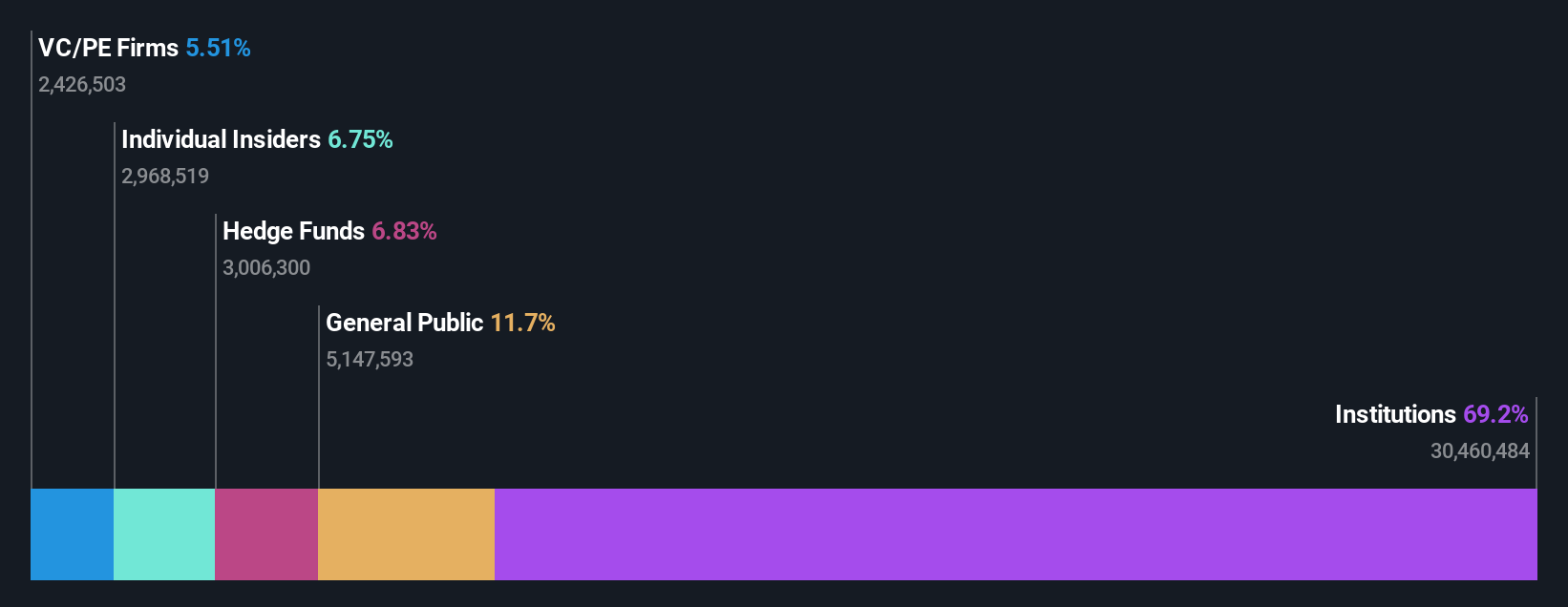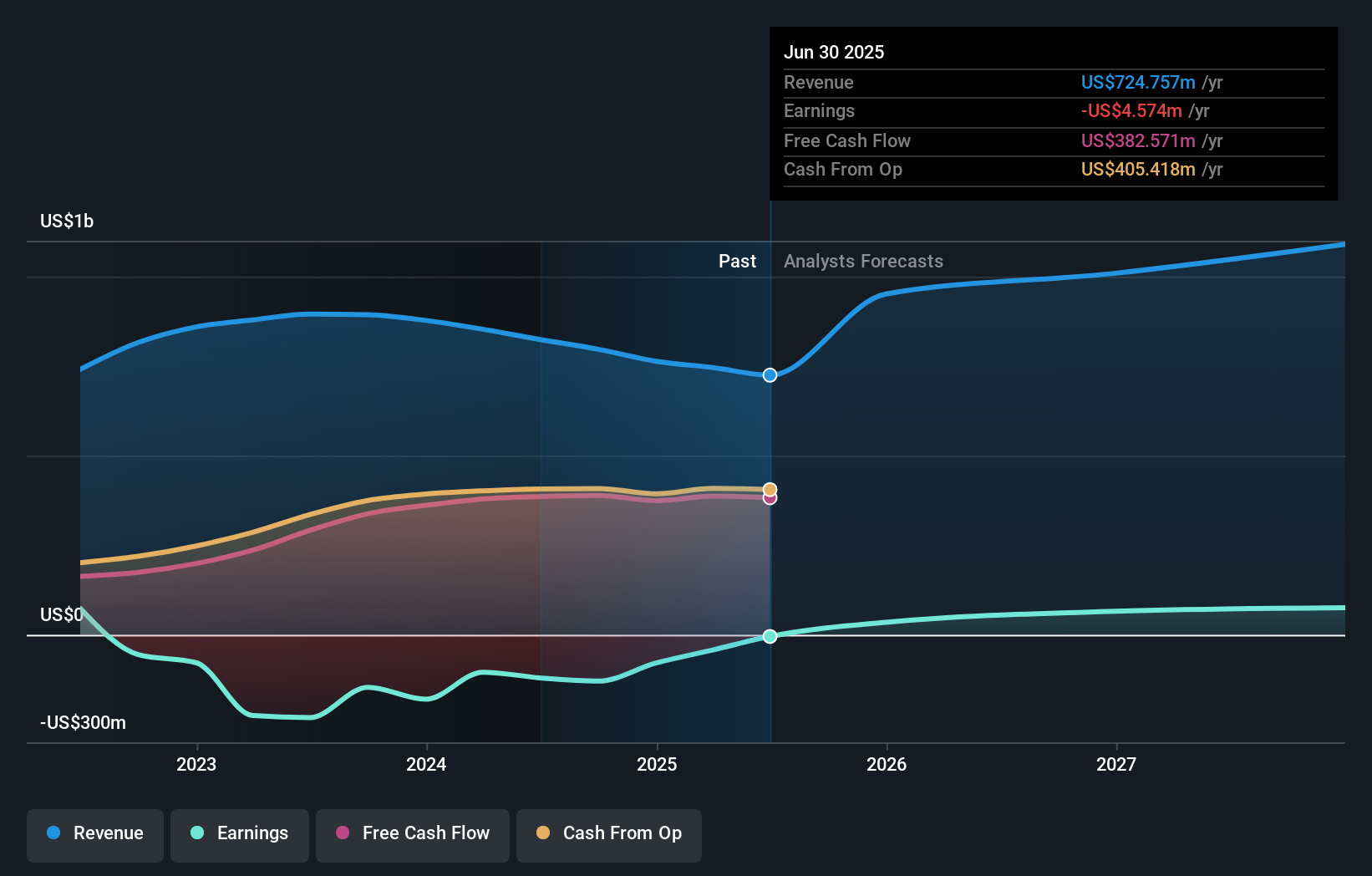- United States
- /
- Consumer Finance
- /
- NasdaqGS:OPRT
Institutional owners may ignore Oportun Financial Corporation's (NASDAQ:OPRT) recent US$33m market cap decline as longer-term profits stay in the green
Key Insights
- Institutions' substantial holdings in Oportun Financial implies that they have significant influence over the company's share price
- 52% of the business is held by the top 12 shareholders
- Insiders have been selling lately
Every investor in Oportun Financial Corporation (NASDAQ:OPRT) should be aware of the most powerful shareholder groups. And the group that holds the biggest piece of the pie are institutions with 69% ownership. That is, the group stands to benefit the most if the stock rises (or lose the most if there is a downturn).
Institutional investors was the group most impacted after the company's market cap fell to US$253m last week. Still, the 104% one-year gains may have helped mitigate their overall losses. But they would probably be wary of future losses.
Let's take a closer look to see what the different types of shareholders can tell us about Oportun Financial.
View our latest analysis for Oportun Financial

What Does The Institutional Ownership Tell Us About Oportun Financial?
Institutional investors commonly compare their own returns to the returns of a commonly followed index. So they generally do consider buying larger companies that are included in the relevant benchmark index.
We can see that Oportun Financial does have institutional investors; and they hold a good portion of the company's stock. This can indicate that the company has a certain degree of credibility in the investment community. However, it is best to be wary of relying on the supposed validation that comes with institutional investors. They too, get it wrong sometimes. When multiple institutions own a stock, there's always a risk that they are in a 'crowded trade'. When such a trade goes wrong, multiple parties may compete to sell stock fast. This risk is higher in a company without a history of growth. You can see Oportun Financial's historic earnings and revenue below, but keep in mind there's always more to the story.

Investors should note that institutions actually own more than half the company, so they can collectively wield significant power. Our data indicates that hedge funds own 6.8% of Oportun Financial. That's interesting, because hedge funds can be quite active and activist. Many look for medium term catalysts that will drive the share price higher. Neuberger Berman Investment Advisers LLC is currently the largest shareholder, with 8.9% of shares outstanding. In comparison, the second and third largest shareholders hold about 6.8% and 5.8% of the stock. Furthermore, CEO Raul Vazquez is the owner of 2.8% of the company's shares.
A closer look at our ownership figures suggests that the top 12 shareholders have a combined ownership of 52% implying that no single shareholder has a majority.
Researching institutional ownership is a good way to gauge and filter a stock's expected performance. The same can be achieved by studying analyst sentiments. There are plenty of analysts covering the stock, so it might be worth seeing what they are forecasting, too.
Insider Ownership Of Oportun Financial
The definition of company insiders can be subjective and does vary between jurisdictions. Our data reflects individual insiders, capturing board members at the very least. Company management run the business, but the CEO will answer to the board, even if he or she is a member of it.
I generally consider insider ownership to be a good thing. However, on some occasions it makes it more difficult for other shareholders to hold the board accountable for decisions.
Our most recent data indicates that insiders own some shares in Oportun Financial Corporation. As individuals, the insiders collectively own US$17m worth of the US$253m company. It is good to see some investment by insiders, but it might be worth checking if those insiders have been buying.
General Public Ownership
The general public-- including retail investors -- own 12% stake in the company, and hence can't easily be ignored. This size of ownership, while considerable, may not be enough to change company policy if the decision is not in sync with other large shareholders.
Private Equity Ownership
With an ownership of 5.5%, private equity firms are in a position to play a role in shaping corporate strategy with a focus on value creation. Sometimes we see private equity stick around for the long term, but generally speaking they have a shorter investment horizon and -- as the name suggests -- don't invest in public companies much. After some time they may look to sell and redeploy capital elsewhere.
Next Steps:
It's always worth thinking about the different groups who own shares in a company. But to understand Oportun Financial better, we need to consider many other factors. To that end, you should be aware of the 1 warning sign we've spotted with Oportun Financial .
But ultimately it is the future, not the past, that will determine how well the owners of this business will do. Therefore we think it advisable to take a look at this free report showing whether analysts are predicting a brighter future.
NB: Figures in this article are calculated using data from the last twelve months, which refer to the 12-month period ending on the last date of the month the financial statement is dated. This may not be consistent with full year annual report figures.
New: AI Stock Screener & Alerts
Our new AI Stock Screener scans the market every day to uncover opportunities.
• Dividend Powerhouses (3%+ Yield)
• Undervalued Small Caps with Insider Buying
• High growth Tech and AI Companies
Or build your own from over 50 metrics.
Have feedback on this article? Concerned about the content? Get in touch with us directly. Alternatively, email editorial-team (at) simplywallst.com.
This article by Simply Wall St is general in nature. We provide commentary based on historical data and analyst forecasts only using an unbiased methodology and our articles are not intended to be financial advice. It does not constitute a recommendation to buy or sell any stock, and does not take account of your objectives, or your financial situation. We aim to bring you long-term focused analysis driven by fundamental data. Note that our analysis may not factor in the latest price-sensitive company announcements or qualitative material. Simply Wall St has no position in any stocks mentioned.
About NasdaqGS:OPRT
Reasonable growth potential with adequate balance sheet.
Similar Companies
Market Insights
Community Narratives




